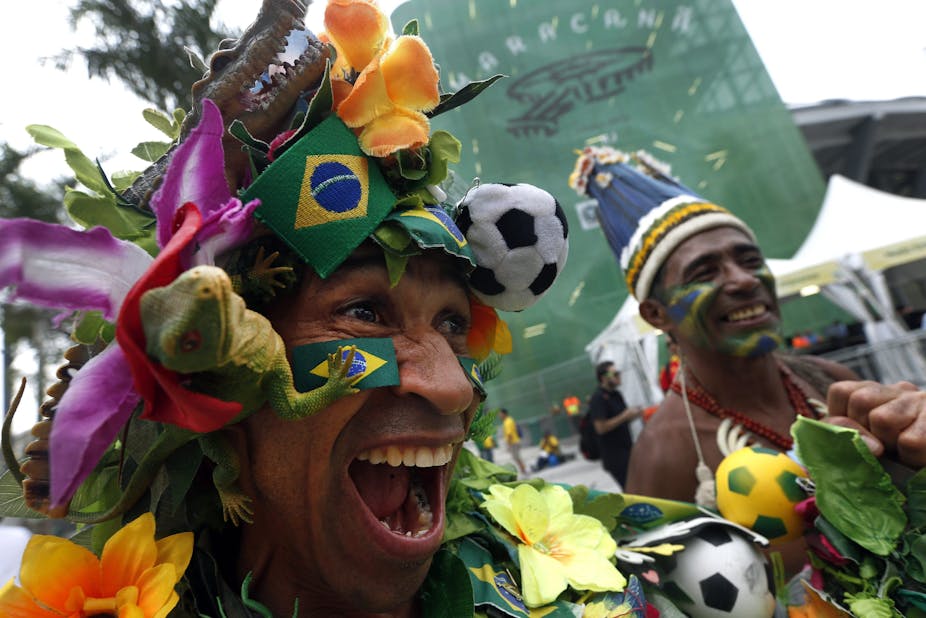It’s June 25, 1978, and a six-year-old Irish boy is watching TV. What he sees that night will remain with him forever.
Argentina won the football World Cup on home soil – the last time the event was held in South America – but what will remain imprinted on his mind is the sky blue-and-white ticker tape as the teams came out of the tunnel like gladiators, covering and enveloping the stadium and pitch like a giant Christmas present, raining down from a football heaven.

On that same day, 12,000 kilometres away, in the southern Argentine town of Trelew, a five-year-old girl is celebrating Argentina’s victory with hundreds of other euphorically proud supporters who wave flags of all sizes. The downtown square is filled with the national colours and the crowd repeatedly and fervently shouts, “Argentina! Argentina! Argentina!”
Years later, and under different circumstances, the authors of this article both realised that these sweet childhood memories had a very bitter side to them.
The outpouring of national pride provoked by the victory of Argentina in the 1978 World Cup was cunningly and deliberately orchestrated by one of the cruelest and most despotic military dictatorships in contemporary Latin American history.
The unspeakable atrocities that were being committed in the prisons and on the streets of Buenos Aires during the tournament were tragically ignored by many.
The image that really mattered was the swagger and superb moustache of Argentina’s striker Leopoldo Luque, and the gazelle-like majesty and magic touch of the tournament’s top scorer, Mario “El Matador” Kempes, who became for many worldwide, the symbols of Argentina.
Although human rights advocates around the world, primarily organised around the Paris-based Committee for the Boycott of the World Cup, expressed concern about the crimes against humanity perpetrated by the military junta led by General Jorge Rafael Videla, the international tournament went ahead.
Videla was the president-dictator during what became known internationally as Argentina’s “dirty war”. He came to power two years before the World Cup, in 1976, forming a three-man military junta with General Orlando Ramón Agosti of the air force and Admiral Emilio Massera of the navy – having ousted President Isabel Martínez de Perón.
All political parties were forbidden, and citizens were subjected to state terrorism.

A few days in any of the Latin American countries that will compete in the World Cup is all anyone needs to realise football is a – mostly – male-dominated obsession that fuels conversations at cafes and hypnotises supporters that watch in a state of trance every match that is screened on television sets.
As such, one could well argue that soccer is the soul of Latin America and, in a continent that has undergone myriad political changes and economic crises, 22 players and a round ball embody one of the very few activities that traverse so many diverse social, political and cultural boundaries.
From Chile to Colombia, football is “el deporte rey”, the king of sports and figures such as Maradona, Pelé, Valderrama or Zamorano are not on a par with political, economic or cultural figures.
On the contrary, they are far more important and any attempt at political, economic or indeed cultural success in Latin America is almost always sought through some association, albeit tenuous, with the world of soccer.
In spite of the overwhelming soccer fever that spreads across the continent, protests in Brazil began in June last year during FIFA’s mini-tournament, the Confederations Cup.

Thousands of Brazilians demonstrated in the streets opposing the government’s significant investment in infrastructure and logistics, which has set a new record in the history of the World Cup. The Brazilian government’s budget has now reached $11.5 billion.
Whereas the Brazilian president Dilma Rousseff has highlighted the freedom people enjoy in Brazil to demonstrate against the government, some commentators were concerned about the repressive response of the police, which included rubber bullets and tear gas.

Former Brazilian football star, Romario, currently congressman for the Socialist Party, has sarcastically declared that FIFA is the president of Brazil; such a critical view seems to validate the protesters who believe the exorbitant amount of money the Brazilian government is spending on the World Cup could have gone to health, education and public infrastructure.
Although the fresh memory of the progressive social and political reforms introduced by Luiz Inácio Lula’s government and continued by president Dilma Rousseff might not be enough to create a political climate favourable to a national celebration, the government seems undeterred by the strong criticism the World Cup plans have generated.
Judging by the way in which football attracts so much passion, and Brazil being a big favourite, the government’s faith in the popularity of the “jogo bonito” to sooth current social tensions might not be so unrealistic.
Will it be Brazil against Argentina in the final as many predict or will Australia, or any of the other nations, spring a shock?
One thing is certain, although football has been used as a political instrument for domination and it feeds multi-million dollar deals that sharply contrast with the struggles of the underpaid and unemployed, for a few short weeks in June and July the illusion will be well and alive: Latin America won’t be a continent of injustice, corruption and poverty but on the contrary, the spiritual home of the beautiful game.
Brazilian protesters will be faced by 170,000 security personnel, even as the whole continent seems united in worshipping at the altar of the the Maracana Stadium on July 13. Will a Brazilian victory be enough or perhaps more telling, what might happen if Brazil lose ?

